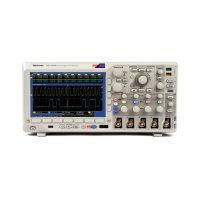Application Exa
mples
Reference
Levels
5. Push Set Levels in to select units.
Set Levels
in
%|
Units
6. Push High Ref and turn multipurpose knob
a to enter 2.00 V. If needed, push Fine to
change the se
nsitivity o f the multipurpose
knob.
High Ref
(a) 2.00 V
Mid Ref
7. Push Low Re
f and turn multipurpose knob
a to enter 800 mV. If needed, push Fine to
change the sensitivity of the multipurpose
knob.
Low Ref
(a) 800 mV
Rise time is typically measured between the 10% and 90% amplitude levels of a signal. These are the default reference
levels th
at the oscilloscope uses for rise time measurements. However, in this example, you need to measure the time that
the signal takes to pass between the 0.8 V and 2.0 V levels.
You can customize the rise time measurement to m easure the signal transition time between any two reference levels. You
can set each of these reference levels to a specific percent of the signal amplitude or to a specific level in vertical units
(such as
volts or amperes).
Measuring specific events. Next you want to see the pulses in the incoming digital signal, but the pulse widths vary so
it is hard to establish a stable trigger. To look at a snapshot of the digital signal, do this step:
1. Push Single to capture a single acquisition.
This assumes that the oscilloscope w ill
trigger with the current settings.
Now you want to measure the width of each
displayed pulse. You can use measurement
gating to select a specific pulse to measure.
To measure the second pulse:
2. Push Measure.
146 MSO3000 and DP O3000 Series Oscilloscopes User Manual

